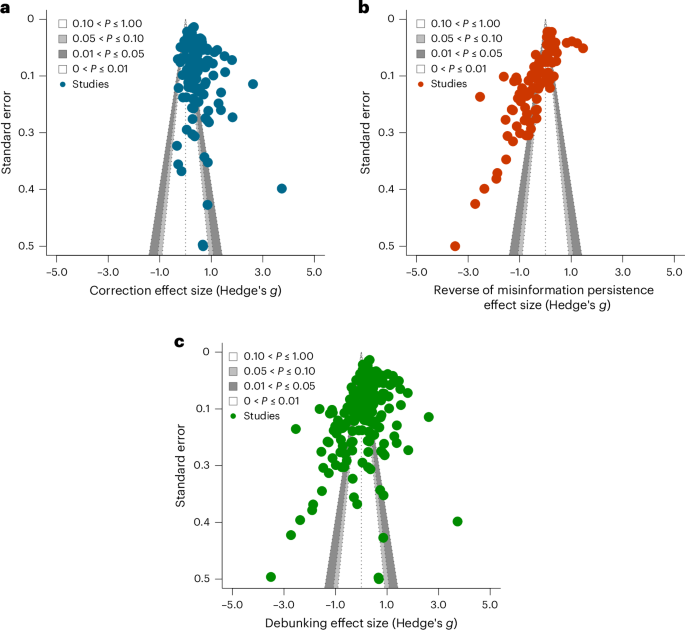Listen to the article
New Research Confirms Effectiveness of Science Misinformation Corrections
A groundbreaking study published in Nature Human Behavior provides compelling evidence that correcting misinformation about science is significantly more effective than previously believed. The research, conducted by Butler and colleagues, builds upon earlier meta-analyses and addresses critical questions about how people respond when presented with corrections to false scientific information.
The study directly responds to concerns raised in a 2023 analysis by Chan and Albarracín, which examined how people update their beliefs when confronted with science-relevant misinformation corrections. While that earlier research showed positive effects of corrections, it also raised questions about the strength and consistency of those effects across different contexts.
Butler’s team employed sophisticated multivariate meta-analytical techniques to provide a more nuanced assessment of how corrections influence belief change. Their methodology represents an important advancement in understanding the complex psychological processes involved in correcting misinformation.
“This research provides crucial insights at a time when scientific misinformation poses significant challenges to public health, climate action, and evidence-based policymaking,” noted one independent researcher familiar with the study.
The findings come amid growing concern about the proliferation of misinformation on social media platforms and its impact on critical issues like vaccine hesitancy, climate change denial, and public health communications. Previous research has shown that misinformation can become deeply entrenched, particularly when it aligns with existing beliefs or identity.
What makes this research particularly valuable is its comprehensive approach to analyzing correction effects across different contexts and populations. The study examined how various factors influence the effectiveness of corrections, including delivery methods, source credibility, and the psychological characteristics of recipients.
“We’ve seen how damaging scientific misinformation can be, especially during crises like the COVID-19 pandemic,” explained a public health communication expert not involved in the research. “Having robust evidence that corrections can work effectively gives communicators and policymakers valuable tools to combat false information.”
The researchers utilized methodological approaches highlighted in recent meta-analytical literature, including techniques developed by Jackson, Riley and White (2011), as well as Mavridis and Salanti (2013). This allowed them to address the complex, multidimensional nature of belief correction in ways that previous studies could not.
Importantly, the research also connects to a growing body of work on psychological inoculation strategies – preventative approaches that “vaccinate” people against misinformation before exposure. Recent studies by Van der Linden (2024) and Spampatti et al. (2024) have demonstrated the effectiveness of pre-emptive inoculation in building resistance to climate disinformation across different countries.
For science communicators, journalists, and public health officials, the research offers encouraging evidence that their efforts to correct misinformation are not in vain. It suggests that well-designed correction strategies can indeed help people update their beliefs with accurate information, even in politically polarized environments.
However, experts caution that correction is just one tool in addressing the broader challenge of misinformation. Complementary approaches include improving media literacy, addressing the structural factors that facilitate misinformation spread on social platforms, and developing more effective science communication strategies.
As societies continue to grapple with complex scientific challenges from climate change to emerging health threats, this research provides a timely reminder that facts still matter – and that people are generally capable of updating their beliefs when presented with corrections in an effective manner.
Fact Checker
Verify the accuracy of this article using The Disinformation Commission analysis and real-time sources.




11 Comments
Fascinating study on the effectiveness of correcting science misinformation. Glad to see research rigorously examining this important issue. Curious to learn more about the nuanced psychological processes involved in belief change.
Agreed, this is a critical area of study. Understanding how to counter misinformation is vital for promoting scientific literacy.
This study provides valuable insights at a crucial time. Combating misinformation is essential for maintaining public trust in science and evidence-based decision-making.
Absolutely. Equipping people with the tools to critically evaluate information and update their beliefs is key to a well-informed society.
Fascinating findings on the psychology of belief change. I’m curious to learn more about the specific techniques used to effectively correct misinformation.
This is an important step forward in understanding the complexities of belief change. Glad to see the researchers taking a nuanced, multi-faceted approach to this issue.
Correcting misinformation is challenging, but this research suggests it can be done effectively. Looking forward to seeing how these insights can be applied in practice to address science-related falsehoods.
Absolutely, translating research into real-world impact is key. Curious to see if the findings hold true across different scientific domains.
Glad to see research tackling this important issue head-on. Curious to learn more about the practical applications of these findings for science communication and education.
Kudos to the research team for tackling this critical problem. Misinformation can have serious consequences, so it’s reassuring to see evidence-based strategies for countering it.
Agreed, this research could have significant real-world impact. Looking forward to seeing how it informs future efforts to address science-related misinformation.